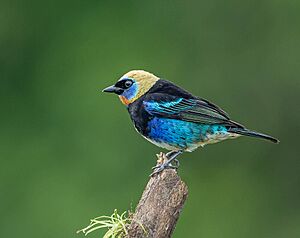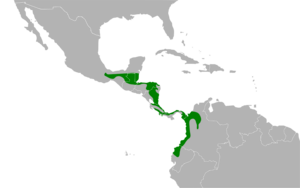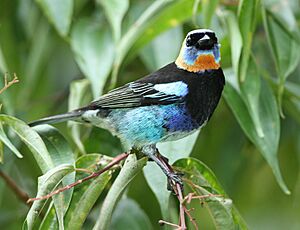Golden-hooded tanager facts for kids
Quick facts for kids Golden-hooded tanager |
|
|---|---|
 |
|
| Adult. Sexes are similar | |
| Conservation status | |
| Scientific classification |
|
| Kingdom: | Animalia |
| Phylum: | Chordata |
| Class: | Aves |
| Order: | Passeriformes |
| Family: | Thraupidae |
| Genus: | Stilpnia |
| Species: |
S. larvata
|
| Binomial name | |
| Stilpnia larvata (Du Bus, 1846)
|
|
 |
|
| Script error: The function "autoWithCaption" does not exist. | |
Script error: No such module "Check for conflicting parameters".
The golden-hooded tanager (scientific name: Stilpnia larvata) is a beautiful, medium-sized bird. It's a type of tanager, known for its bright colors. These birds live all year round in areas from southern Mexico down to western Ecuador.
Contents
About the Golden-hooded Tanager
What They Look Like
Adult golden-hooded tanagers are about 13 centimeters (5 inches) long. They weigh around 19 grams (0.67 ounces), which is about as much as a few quarters.
Male birds have a bright golden head. They also have a black mask around their eyes. This mask has pretty violet-blue edges. Their body is mostly black. But they have turquoise on their shoulders and lower back. Their wings and tail also have turquoise edges. The sides of their body are blue, and their belly is white.
Female birds look a bit different. Their heads might have a greenish tint. Sometimes, they have small black spots on the top of their heads. Their white belly area is usually larger than the males'. Young birds are not as colorful. They have green heads and dark gray upper bodies. Their undersides are off-white, and they have very little blue.
Where They Live
Golden-hooded tanagers live in warm places. You can find them from sea level up to about 1,500 meters (4,900 feet) high. They prefer the tops of tall trees in thick forests. They also like areas that are partly open. This includes clearings, places where new trees are growing, and gardens with lots of plants.
What They Sound Like
The golden-hooded tanager has a sharp call that sounds like tsit. When they sing, it's a series of quick, rattling tick sounds. It's not a very musical song.
Golden-hooded Tanager Life
What They Eat
Golden-hooded tanagers often fly around in pairs. Sometimes, you'll see them in family groups. They also join larger groups of different bird species looking for food. They mostly eat small fruit, which they usually swallow whole. For example, they enjoy the fruit from the Trophis racemosa tree. They also eat insects.
Reproduction and Family Life
These birds build their nests in a tree fork. Sometimes, they even build them inside a bunch of green bananas! Their nest is shaped like a cup. A female usually lays two white eggs with brown spots.
Golden-hooded tanagers often have two groups of chicks in one year. What's cool is that the young birds from the first group often help. They assist their parents in feeding the second group of baby birds.
 | Jewel Prestage |
 | Ella Baker |
 | Fannie Lou Hamer |



